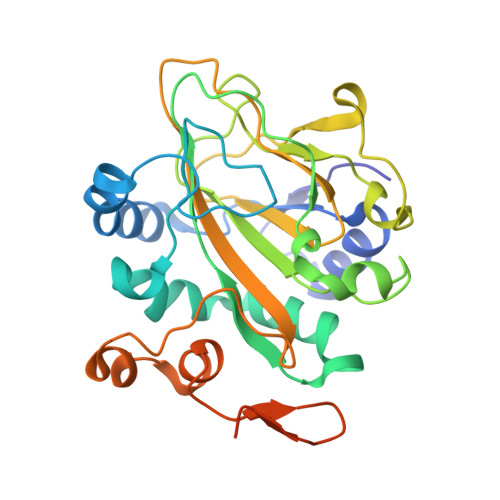Molecular insights into the unusually promiscuous and catalytically versatile Fe(II)/ alpha-ketoglutarate-dependent oxygenase SptF.
Tao, H., Mori, T., Chen, H., Lyu, S., Nonoyama, A., Lee, S., Abe, I.(2022) Nat Commun 13: 95-95
- PubMed: 35013177
- DOI: https://doi.org/10.1038/s41467-021-27636-3
- Primary Citation of Related Structures:
7EYR, 7EYS, 7EYT, 7EYU, 7EYW, 7FCB - PubMed Abstract:
Non-heme iron and α-ketoglutarate-dependent (Fe/αKG) oxygenases catalyze various oxidative biotransformations. Due to their catalytic flexibility and high efficiency, Fe/αKG oxygenases have attracted keen attention for their application as biocatalysts. Here, we report the biochemical and structural characterizations of the unusually promiscuous and catalytically versatile Fe/αKG oxygenase SptF, involved in the biosynthesis of fungal meroterpenoid emervaridones. The in vitro analysis revealed that SptF catalyzes several continuous oxidation reactions, including hydroxylation, desaturation, epoxidation, and skeletal rearrangement. SptF exhibits extremely broad substrate specificity toward various meroterpenoids, and efficiently produced unique cyclopropane-ring-fused 5/3/5/5/6/6 and 5/3/6/6/6 scaffolds from terretonins. Moreover, SptF also hydroxylates steroids, including androsterone, testosterone, and progesterone, with different regiospecificities. Crystallographic and structure-based mutagenesis studies of SptF revealed the molecular basis of the enzyme reactions, and suggested that the malleability of the loop region contributes to the remarkable substrate promiscuity. SptF exhibits great potential as a promising biocatalyst for oxidation reactions.
Organizational Affiliation:
Graduate School of Pharmaceutical Sciences, The University of Tokyo, Tokyo, Japan.

















